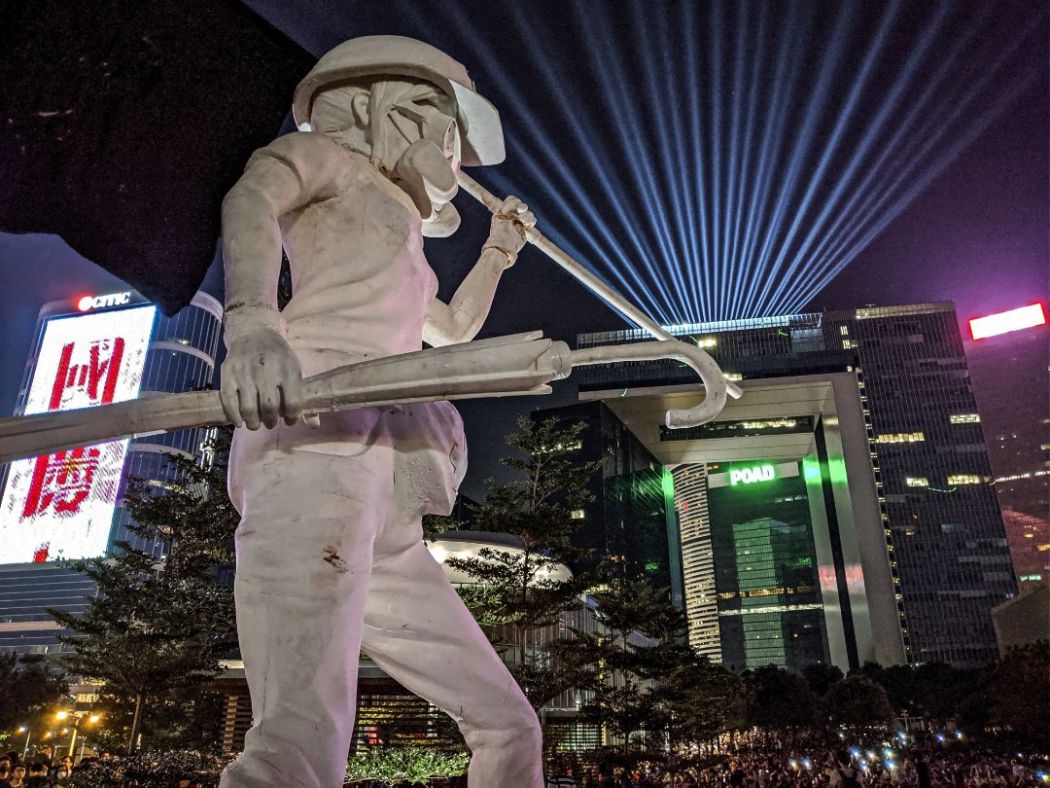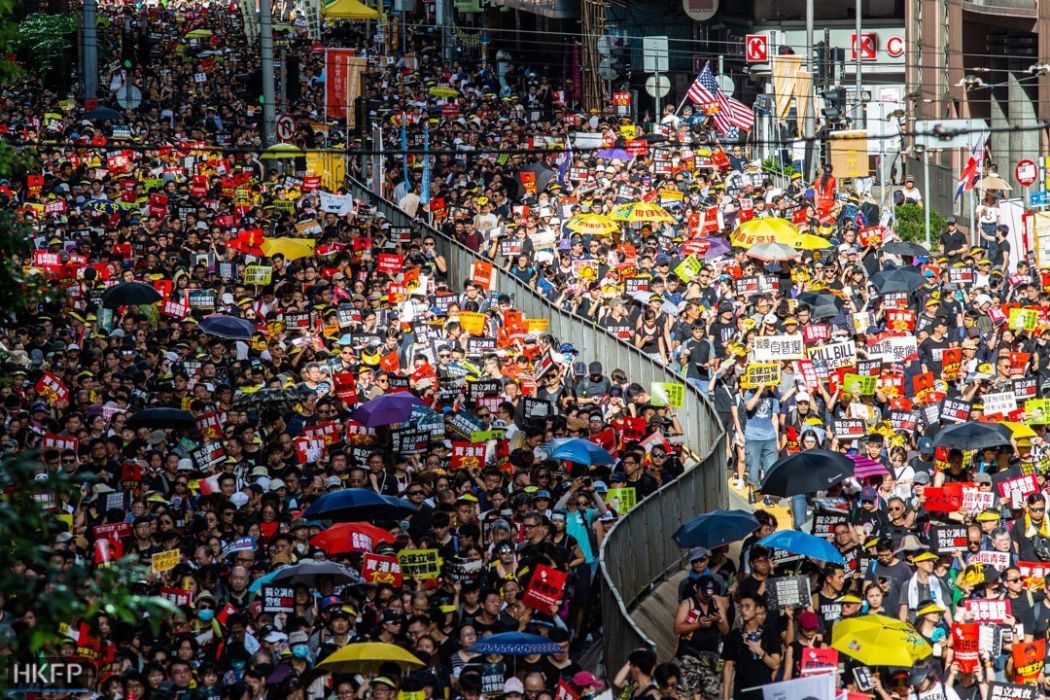By Kieran Colvert
Authoritarian regimes have a fatal weakness. It always gets them in the end. In the absence of a democratic mandate, they need to cultivate the illusion that the autocrats consult the people in whose name they rule, that they act in the interests of the people, and most of all, that the people are blissfully happy under their wise leadership.
As everyone knows, if you tell a lie and persevere in maintaining the fiction, it quickly leads you to other bigger lies, as reality obstinately refuses to fall in line. Thus, totalitarian states have a habit of basing their legitimacy on an official narrative which gets increasingly, ludicrously distant from the facts on the ground.

This principle was on display in our Chief Executive’s Policy Address 2019. The address comes at a time when Hong Kong is facing an existential crisis but did we hear any mention of any real solutions to the catastrophe engulfing us?
Did we hear anything about the establishment of an independent commission of inquiry into police conduct during the protests? Did we hear anything about steps towards the implementation of universal suffrage for Legislative Council and Chief Executive elections? No, we didn’t. Our wise leader decided to devote her Policy Address to housing issues, land supply and economic development.
We should perhaps not be too surprised. The “official narrative” to explain the five months of protests in Hong Kong is that young people in the city have been led astray by foreigners.
And, by the way, they are not really protesting about the Extradition Bill and the slow creep of authoritarianism in Hong Kong under a succession of chief executives handpicked by our ‘central authorities’. No, what they really want is to be able to buy their own homes. Hence the fact that the Policy Address is big on housing to help allay “a source of public grievances.”

Anyone actually living in Hong Kong will know just how far removed from reality this official narrative has become. The protest movement in 2019 is a resurfacing of popular discontent at the remoulding of the city as a hollowed-out, authoritarian-friendly shell of itself.
At every step of the way in our slow descent into this abyss, Hong Kong people have come out onto the streets to defend their way of life. The last time we saw mass street protests was in 2014 after the Standing Committee of the PRC legislature (the National People’s Congress) ruled on what ‘universal suffrage’ in Hong Kong, as promised by our mini-constitution the Basic Law, might look like.
The then administration in Hong Kong, led by Chief Executive Leung Chun-ying, wanted us to believe that ‘universal suffrage’ would be achieved by the ‘central authorities’ choosing a small number of candidates for Hong Kong’s Chief Executive and then leaving it to the Hong Kong people to decide between them.
You would have thought, in an ideal world, that it would have been hard for anyone to keep a straight face when proposing that one. But apparently not – not known for their sense of humour, though, your average autocrat.
People pointed out at the time, that, as in the Chinese saying, this proposal was like trying to pass off a deer as a horse. It might be more accurate to see it as trying to pass off an ant as an elephant.

Our current Chief Executive, Carrie Lam, has outdone her predecessor in her enthusiasm for this type of Orwellian doublespeak. What kicked off the current protests was her claim that Hong Kong needed an Extradition Bill to enable her government to send Hong Kongers to the Mainland to stand trial in the Mainland’s well-respected courts for contravening the Mainland’s well-respected laws.
Having stirred up a hornets’ nest of opposition to this laudable plan, she is now taking Hong Kong down an even more dangerous path. The imposition of the Prohibition on Face Covering Regulation (PFCR), via a law that was enacted back in 1922 by the colonial British administration – the Emergency Regulations Ordinance (ERO) – looks a lot like our embattled Chief Executive bypassing the legislature to enact a law to make it impossible for people to go on protesting against her policies.
But no, we have got that quite wrong apparently, the PFCR is a necessary and justified piece of ‘subsidiary legislation’ that will be tabled in the Legislative Council at its next sitting. Thanks for putting us right on that point, but it does seem a little odd to have a law imposed and people arrested for breaching it before it gets passed by the legislature.
And then there’s the small problem that the Basic Law establishes a clear separation of powers between the executive and legislative branches of government – the Chief Executive can propose laws but the power to enact them is reserved for the Legislative Council.

The only good news in all of this is that the further our government strays into the cloud cuckoo land of its own creation, the more likely it is to fail. We have already seen several mass rallies of mask-wearing protesters. This might seem to be a dangerous and futile gesture, but it is actually aimed at the Achilles heel of authoritarianism – the lie that underpins its legitimacy.
Given the choice, surprise surprise, most people like to have civil and political rights, a free press, an independent judiciary, the rule of law and democratic accountability to ensure that those in power cannot abuse that power with impunity.
In his essay, ‘Power of the Powerless’, Vaclav Havel, a victim but ultimately a survivor of the authoritarian regime of Czechoslovakia in the 1970s, suggests that the most effective way to defeat a totalitarian regime is for citizens to ‘live in truth’.
Havel writes about a greengrocer who has to place a propaganda slogan in his window. He does this not because he believes in the slogan but because the totalitarian regime he lives under requires him to. But what if one day the greengrocer refuses to put the slogan in his window?
What if his neighbours, the butchers and bakers in his street, similarly refuse? What if a majority of people living in his country decide not to go along with the fictions the autocrats have come up with to support their legitimacy? Havel’s message is that we are not powerless to resist, and defeating authoritarianism starts with calling out the lies it is founded on.
Kieran Colvert is a writer and long-term resident of Hong Kong.
